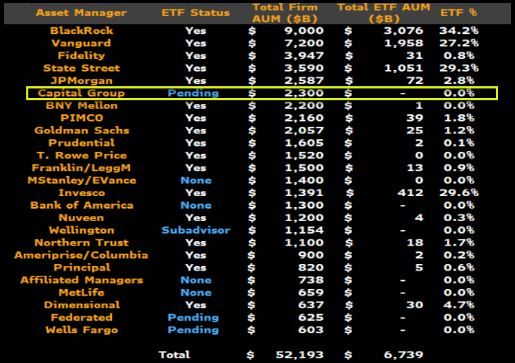(Bloomberg) — Welcome to the ETF Weekender, your round-up of the biggest and most interesting stories from the hottest corner of Wall Street.
These may be the dog days of summer, but with U.S.
stocks hitting relentless record highs as Federal Reserve Chair Jerome Powell preps the taper there’s been enough market action to keep ETF folk busy.
In this week’s weekender: A mega new issuer is coming, regulators fixate on green washing, and new research debunks the very notion of ‘passive’ investing.
These are the stories you need to read.
Welcome to the Capital
What happened: One of the biggest money managers without its own ETF offering — Capital Group — has announced the timing and details of its long-awaited entry to the $6.7 trillion U.S.
market.
Why it matters: The number of major players in the investing industry without a presence is dwindling rapidly as investors make their preference clear for the easy-to-trade and tax-efficient vehicle. The capitulation by the holdouts since a late-2019 rule change has been a hammer blow to the mutual fund industry.
Read it here.
Doing Good, Badly?
What happened: Deutsche Bank’s DWS unit is facing probes in the U.S.
and Germany after claims by a former employee that it overstated the ESG compliance of its assets. DWS, which is one of the largest ETF issuers in Europe, rejects the allegations.
Why it matters: For all the ESG fever sweeping the financial world, confusion is rife about how standards are defined and measured, amid fears of “green washing.” With officials in the U.S.
and Europe looking into accusations against DWS suggests regulators are stepping up policing of the sector.
Read about the share reaction here, and DWS’s response here.
Passive, Attacked
What happened: Two new pieces of research have laid bare exactly how “passive” Wall Street’s indexing revolution really is.
Spoiler alert: Not very.
Why it matters: The generally accepted narrative in markets is that index investing is taking over, threatening to destroy price discovery as passive cash simply chases stocks up or down.
But this is possibly a myth: Behind every passive investment is an active decision, and within every fund choices are made about strategy, structure and execution that mean the market is as active as 20 years ago.
Read it here.
Want more?
Bonus weekend reading
- Cathie Wood Stake in $17.5 Billion Harry Sloan SPAC Hits 11%.
- Tech Fund Becomes Biggest China ETF Even as Stock Rebound Stalls.
- Tiny Issuer Thinks It Just Got the Edge in Race for Bitcoin ETF.
- Michael Burry’s Pretty Big Short Hinges on Treasuries Sinking.
- A Quest for MEME Leads to the Ticker Gray Market and Beyond.
Good Intel: Challenging Vanguard
A glimpse at the Bloomberg Intelligence analysis available on the terminal.
Instead of taking on ARK and theme ETFs, Capital Group will offer core active strategies that span asset classes — competing directly with the likes of Vanguard and BlackRock.
It has the deep pockets needed to try to compete with ultra-cheap rivals, but it will have to rely on its distribution and existing clients. New ETFs have historically taken years to attract organic flows, and even large issuers such as Fidelity and T.
Rowe Price have struggled to gain traction.
ETF Jeopardy!
This ETF seeks to ride the retail-investor revolution, tracking sentiment in online forums and message boards to decide what to hold.
However, after a hot start earlier this year it’s struggled to keep investor attention and assets have dropped from a peak of $500 million to about $220 million now.
That’s the answer.
The question identifying this fund will appear in the next edition. Last week’s question: What is the KraneShares CSI China Internet Fund, ticker KWEB?
ETF Weekender is taking a break and will return Sept.
11.
More stories like this are available on bloomberg.com
©2021 Bloomberg L.P.











